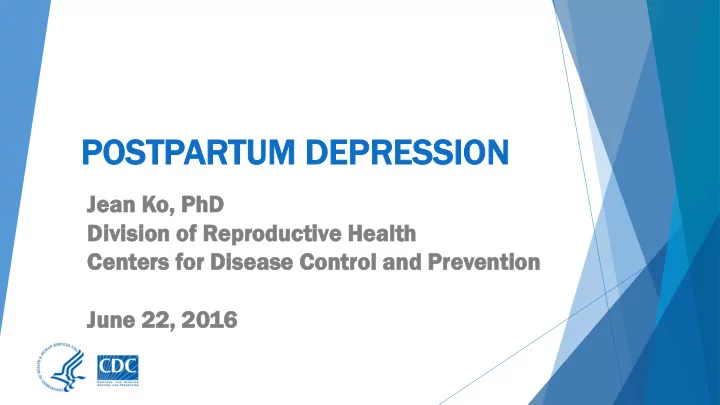

POS OSTP TPART ARTUM UM DE DEPRESS RESSION ION Jean an Ko, Ph PhD Divi vision sion of f Reproduct roductiv ive e Health alth Cente nters s for Disease sease Control ntrol and d Pr Preventi ention n June ne 22, 2, 2016 6
Postpar tpartum tum De Depr pres essio sion Major and minor depression occurring in the postpartum period Different from “baby blues” Common in the first 7 – 10 days after childbirth Symptoms such as irritability, insomnia, interpersonal sensitivity Resolve within a few days without intervention O’Hara & Segre, 2008; Goodman 2004
Diagnos agnostic tic and d Statis tistical tical Manual nual-V: : Depre pression ssion ≥ 5 of the following symptoms during same 2-week period Depressed mood Diminished interest or pleasure in activities Weight loss or gain Insomnia or hypersomnia Psychomotor agitation or retardation Fatigue or loss of energy Feelings of worthlessness or excessive or inappropriate guilt Diminished ability to think or concentrate, or indecisiveness Recurrent thoughts of death, suicidal ideation, or suicide attempt Significant impairment in a person’s social, occupational, or other functioning DSM-V (http://psychiatryonline.org/doi/10.1176/appi.books.9781585625031.rh11)
Burden of Postpartum Depression Major and minor depression prevalence: 6.5% to 12.9% during the first year postpartum Pregnancy Risk Assessment Monitoring System (PRAMS): 11.9% self-reported postpartum depressive symptoms Gaynes et al. 2005; Robbins, 2014
Postpartum Depressive Symptoms, 2011 http://nccd.cdc.gov/PRAMStat
Risk Factors for Postpartum Depression Low social support Low income Low education High stress Family or personal history Depression during pregnancy 54% of women with postpartum depression had depression diagnosis during or preceding pregnancy O’Hara, 2009; Dietz et al., 2007
Impact on Women, Children, and Families Anxiety Low birth weight Substance abuse Preterm birth Lower use of effective Poor maternal-infant contraceptive methods attachment Suicide Altered neonatal, infant, & child health & development Bodnar et al. 2009; Cripe et al. 2011; Flynn & Chermack, 2008; Forman et al. 2007; Grote et al. 2010; Sohr-Preston & Scaramella, 2006; Wisner et al. 2009; Barnes 2006; Dennis & McQueen, 2009; Farr et al., 2011; Farr & Bish, 2013; Bitsko et al., 2016
Depression Screening American College of Obstetricians and Gynecologists (ACOG) and U.S. Preventative Service Task Force guidelines updated in 2015: Recommend screening pregnant and postpartum women for depression Systems should be in place to ensure follow-up for diagnosis and treatment Screening alone may not improve treatment rates or depressive symptomology Kozhimanill et al., 2011 and Yonkers et al., 2009
Opportunities for Improved Care Clinical Depressive Diagnosis of Treatment Symptoms Depression 58.8% of women 50% of women with depressive with clinical symptomology do diagnosis do not not receive receive treatment clinical diagnosis of any kind Ko et al., 2012
What systems should be in place? Screening and treatment at a woman’s usual site of care Possibly eliminates barriers to diagnosis and treatment 3-stepped care approach RCTs demonstrate high screening and lower depressive symptomology Postpartum women in Hong Kong Postpartum women in family medicine clinics Only included 32% of women who screened positive for depression Leung et al, 2011; Yawn et al 2012; Melville et al., 2014
PRISM: Program in Support of Moms University of Massachusetts, Worcester 5-year cooperative agreement 12 OB/GYN clinics in Massachusetts Academic, private, hospital-affiliated clinics Randomized to stepped care intervention or enhanced usual care MCPAP for Moms = Enhanced usual care MA Child Psychology Access Project (MCPAP) for Moms 2013 Massachusetts funded MCPAP for Moms to address perinatal depression www.mcpapformoms.org
Ongoing CDC Activities Research and surveillance Technical assistance to states Bi-weekly news and literature updates Find us on the web: http://www.cdc.gov/reproductivehealth/depression/index.htm http://www.cdc.gov/features/maternal-depression/index.html
Recommend
More recommend